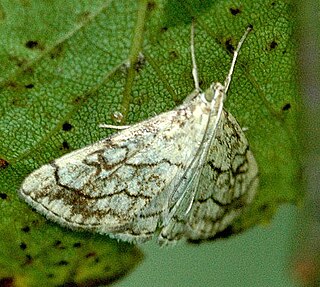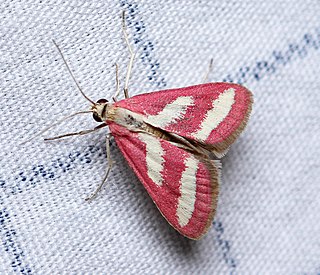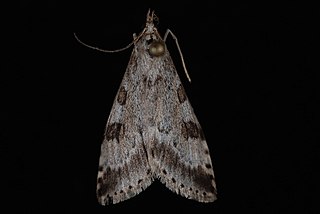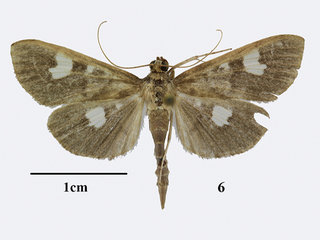
Evergestinae is a fairly small subfamily of the lepidopteran family Crambidae, the crambid snout moths. The subfamily was described by H. Marion in 1952. It contains roughly 140 species on all continents and continental islands. Evergestine moths resemble Pyraustinae; however, the male genitalia have a long uncus and long, slender gnathos. The larvae feed mostly on Brassicaceae.

Orenaia is a genus of moths of the family Crambidae.
Evergestis borregalis is a moth in the family Crambidae. It was described by Eugene G. Munroe in 1974. It is found in North America, where it has been recorded from California and New Mexico.
Evergestis comstocki is a moth in the family Crambidae. It was described by Eugene G. Munroe in 1974. It is found in North America, where it has been recorded in California and Oregon.
Evergestis palousalis is a moth in the family Crambidae. It was described by Eugene G. Munroe in 1974. It is found in North America, where it has been recorded from Alberta, British Columbia, California, Colorado, Nevada, Oregon and Utah.
Orenaia arcticalis is a moth in the family Crambidae. It was described by Eugene G. Munroe in 1974. It is found in Canada, where it has been recorded from the Northwest Territory and Yukon Territory.
Orenaia coloradalis is a moth in the family Crambidae. It was described by William Barnes and James Halliday McDunnough in 1914. It is found in North America, where it has been recorded from Arizona and Colorado.
Orenaia macneilli is a moth in the family Crambidae. It was described by Eugene G. Munroe in 1974. It is found in North America, where it has been recorded from California.
Orenaia pallidivittalis is a moth in the family Crambidae. It was described by Eugene G. Munroe in 1956. It is found in North America, where it has been recorded from British Columbia.
Prorasea fernaldi is a moth in the family of Crambidae. It was described by Eugene G. Munroe in 1974. It is found in North America, where it has been recorded from Colorado, New Mexico and Wyoming.
Prorasea gracealis is a moth in the family Crambidae. It was described by Eugene G. Munroe in 1974. It is found in North America, where it has been recorded from California.
Lipocosma septa, the exposed lipocosma moth, is a moth in the family Crambidae. It was described by Eugene G. Munroe in 1972. It is found in North America, where it has been recorded from Florida, Georgia, Maryland, North Carolina, Oklahoma, South Carolina, Texas and Virginia.
Loxostege sierralis is a moth in the family Crambidae. It was described by Eugene G. Munroe in 1976. It is found in North America, where it has been recorded from British Columbia, Saskatchewan, Washington, Utah, Oregon and California.
Scoparia apachealis is a moth in the family Crambidae. It was described by Eugene G. Munroe in 1972. It is found in North America, where it has been recorded from Arizona, New Mexico and Utah.

Noctueliopsis rhodoxanthinalis is a moth in the family Crambidae. It was described by Eugene G. Munroe in 1974. It is found in North America, where it has been recorded from Texas.
Palpita kimballi, or Kimball's palpita moth, is a moth in the family Crambidae. It was described by Eugene G. Munroe in 1959. It is found in North America, where it has been recorded from Alabama, Florida, Georgia, Louisiana, North Carolina, Oklahoma, South Carolina, Tennessee and Virginia.
Udea abstrusa is a moth in the family Crambidae. It was described by Eugene G. Munroe in 1966. It is found in North America, where it has been recorded from Alberta, British Columbia, Colorado, New Mexico, the Northwest Territory, Washington and Wyoming.
Udea cacuminicola is a moth in the family Crambidae. It was described by Eugene G. Munroe in 1966. It is found in North America, where it has been recorded from Colorado and Wyoming.

Udea washingtonalis, the Washington udea moth, is a moth in the family Crambidae. It was described by Augustus Radcliffe Grote in 1882. It is found in North America, where it has been recorded from Alaska, British Columbia, California, Montana and Washington.

Agroterini is a tribe of the species-rich subfamily Spilomelinae in the pyraloid moth family Crambidae. The tribe was erected by Alexandre Noël Charles Acloque in 1897.




